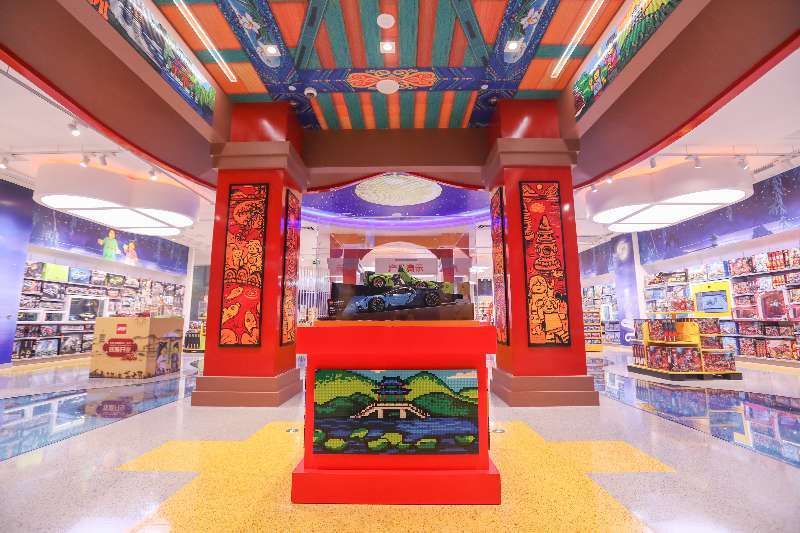
Lego opened a flagship store in Hangzhou in June, the fourth in the country, with two in Shanghai and one in Beijing. (Photos provided to chinadaily.com.cn)
Christiansen said during the first half the company attracted new builders of all ages who turned to Lego play to help them through difficult times.
During the first half of 2020, the group unveiled Lego Super Mario, an entirely new play experience that blends digital and physical play. It also launched Lego Monkie Kid, the first theme designed around Chinese folklore to make the brand and products more relevant to local consumers.
On enhancing digital engagement, in the first six months, downloads of Lego digital building instructions doubled to 2 million and every two seconds a piece of content was shared on Lego Life, a digital play app, which has more than 9 million users.
Visitors to the Lego.com e-commerce platform doubled to more than 100 million in the first half of 2020, compared with the same period a year ago, a key factor fuelling its online sales. In China, Lego renovated its Tmall store into its flagship store in August as a directly operated e-commerce platform to bring more innovated products and experiences for consumers in China.
The company plans to continue to expand offline.
It is on track to open about 120 new retail stores in 2020, 80 of those in China. During the first half, it opened 46 retail stores, 30 in China.
The CEO is confident of the rising opportunities for an omnichannel business model.
"We will continue to invest in upgrading our e-commerce capabilities to support both our retail partners and own platform and continue to invest in creating fantastic physical brand experiences for shoppers and fans," said Christiansen.

In May, Lego launched Lego Monkie Kid, the first theme designed around Chinese folklore to make the brand and products more relevant to local consumers.
World-leading toy maker the Lego group on Wednesday posted a strong double-digit growth for the first half year in major markets, including China, driven by strong sales, which are boosted from its investment e-commerce and product innovation despite the global pandemic impacting the toy industry.
The group reported its earnings for the six months ending June 20 and said revenue grew 7 percent to DKK 15.7 billion ($2.5 billion) compared with the same period in 2019. Consumer sales grew 14 percent compared with that of last year. Its brand's global market share increased.
Lego's operating profit was DKK 3.9 billion, an increase of 11 percent compared with 2019.
"During the first half, we saw the benefits of our investments in long-term growth initiatives, such as e-commerce and product innovation. Our strong portfolio appealed to builders of all ages and our recently upgraded e-commerce platform and agile global supply chain allowed us to fulfill online demand. We also collaborated closely with our retail partners to ensure they could continue to supply their shoppers online," Niels B. Christiansen, Lego group CEO, said.
The group delivered double digit consumer sales growth in its major markets, including the Americas, Western Europe, Asia Pacific and China.
Speaking on the trends shaping the toy industry, the CEO said digitalization and e-commerce are accelerating as a result of the pandemic.
"We saw strong growth in digital and traditional play, a rapid shift to e-commerce and the importance of having a truly global operating model," he said.
The company launched a digital initiative, "Let's Build Together", to bring learning through play to children whose education was disrupted due to the pandemic. The initiative saw thousands of hours of online content and play ideas reach more than 80 million users around the world.


